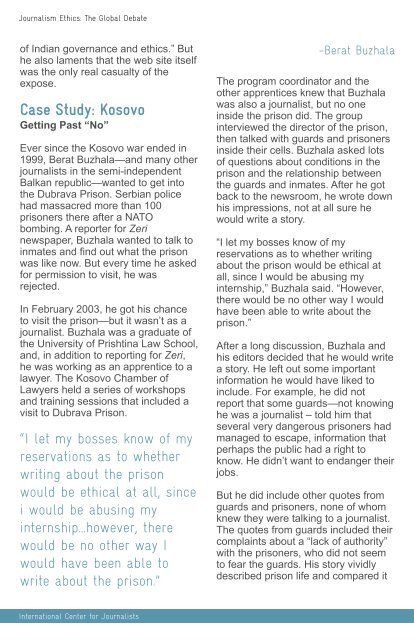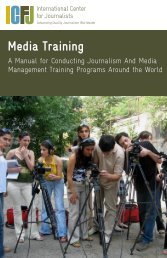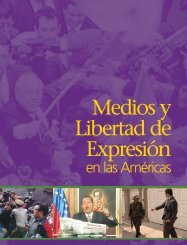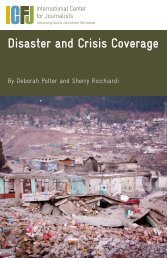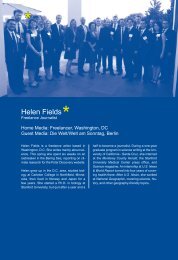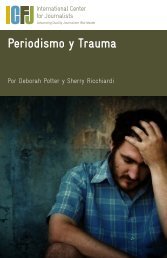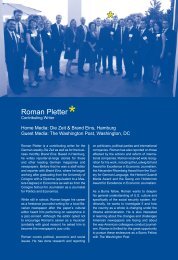Download PDF - International Center for Journalists
Download PDF - International Center for Journalists
Download PDF - International Center for Journalists
You also want an ePaper? Increase the reach of your titles
YUMPU automatically turns print PDFs into web optimized ePapers that Google loves.
Journalism Ethics: The Global Debate<br />
of Indian governance and ethics.” But<br />
he also laments that the web site itself<br />
was the only real casualty of the<br />
expose.<br />
Case Study: Kosovo<br />
Getting Past “No”<br />
Ever since the Kosovo war ended in<br />
1999, Berat Buzhala—and many other<br />
journalists in the semi-independent<br />
Balkan republic—wanted to get into<br />
the Dubrava Prison. Serbian police<br />
had massacred more than 100<br />
prisoners there after a NATO<br />
bombing. A reporter <strong>for</strong> Zeri<br />
newspaper, Buzhala wanted to talk to<br />
inmates and find out what the prison<br />
was like now. But every time he asked<br />
<strong>for</strong> permission to visit, he was<br />
rejected.<br />
In February 2003, he got his chance<br />
to visit the prison—but it wasn’t as a<br />
journalist. Buzhala was a graduate of<br />
the University of Prishtina Law School,<br />
and, in addition to reporting <strong>for</strong> Zeri,<br />
he was working as an apprentice to a<br />
lawyer. The Kosovo Chamber of<br />
Lawyers held a series of workshops<br />
and training sessions that included a<br />
visit to Dubrava Prison.<br />
“I let my bosses know of my<br />
reservations as to whether<br />
writing about the prison<br />
would be ethical at all, since<br />
i would be abusing my<br />
internship...however, there<br />
would be no other way I<br />
would have been able to<br />
write about the prison.”<br />
-Berat Buzhala<br />
The program coordinator and the<br />
other apprentices knew that Buzhala<br />
was also a journalist, but no one<br />
inside the prison did. The group<br />
interviewed the director of the prison,<br />
then talked with guards and prisoners<br />
inside their cells. Buzhala asked lots<br />
of questions about conditions in the<br />
prison and the relationship between<br />
the guards and inmates. After he got<br />
back to the newsroom, he wrote down<br />
his impressions, not at all sure he<br />
would write a story.<br />
“I let my bosses know of my<br />
reservations as to whether writing<br />
about the prison would be ethical at<br />
all, since I would be abusing my<br />
internship,” Buzhala said. “However,<br />
there would be no other way I would<br />
have been able to write about the<br />
prison.”<br />
After a long discussion, Buzhala and<br />
his editors decided that he would write<br />
a story. He left out some important<br />
in<strong>for</strong>mation he would have liked to<br />
include. For example, he did not<br />
report that some guards—not knowing<br />
he was a journalist – told him that<br />
several very dangerous prisoners had<br />
managed to escape, in<strong>for</strong>mation that<br />
perhaps the public had a right to<br />
know. He didn’t want to endanger their<br />
jobs.<br />
But he did include other quotes from<br />
guards and prisoners, none of whom<br />
knew they were talking to a journalist.<br />
The quotes from guards included their<br />
complaints about a “lack of authority”<br />
with the prisoners, who did not seem<br />
to fear the guards. His story vividly<br />
described prison life and compared it<br />
<strong>International</strong> <strong>Center</strong> <strong>for</strong> <strong>Journalists</strong>


